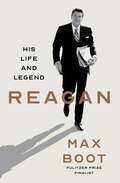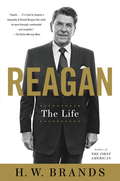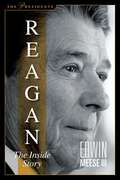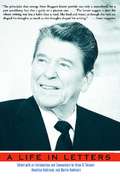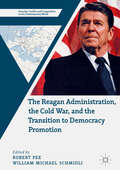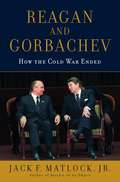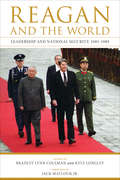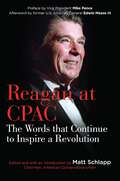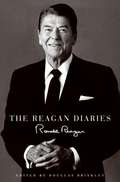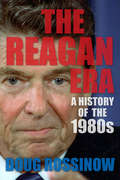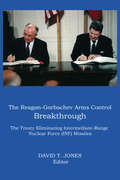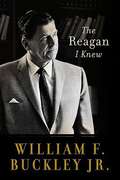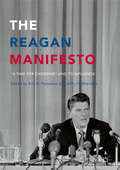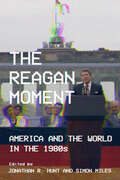- Table View
- List View
Reagan: His Life and Legend
by Max BootSon of the Midwest, movie star, and mesmerizing politician—America’s fortieth president comes to three-dimensional life in this gripping and profoundly revisionist biography. <P><P> In this “monumental and impressive” biography, Max Boot, the distinguished political columnist, illuminates the untold story of Ronald Reagan, revealing the man behind the mythology. Drawing on interviews with over one hundred of the fortieth president’s aides, friends, and family members, as well as thousands of newly available documents, Boot provides “the best biography of Ronald Reagan to date” (Robert Mann). <P><P> The story begins not in star-studded Hollywood but in the cradle of the Midwest, small-town Illinois, where Reagan was born in 1911 to Nelle Clyde Wilson, a devoted Disciples of Christ believer, and Jack Reagan, a struggling, alcoholic salesman. Boot vividly creates a portrait of a handsome young man, indeed a much-vaunted lifeguard, whose early successes mirrored those of Horatio Alger. And contextualizing Reagan’s life against American history, Boot re-creates the world in which Reagan transitioned from local Iowa sportscaster to budding screen actor. <P><P> The world of Hollywood from the 1930s to the 1950s would prove significant, not only in Reagan’s coming-of-age in such classics as Knute Rockne and Kings Row but during the twilight of his film career, when he played opposite a chimpanzee in Bedtime for Bonzo, and then his eventual emergence as a television host of General Electric Theater, which established his bona fides as one of the leading conservative voices of the time. Indeed, the leap to California governor in 1966 seemed almost preordained, in which Reagan became a bellwether for a nation in the throes of a generational shift. <P><P> Reagan’s 1980 presidential election augured a shift that continues into this century. Boot writes not as a partisan but as a historian seeking to set the story straight. He explains how Reagan was an ideologue but also a supreme pragmatist who signed pro-abortion and gun control bills as governor, cut deals with Democrats in both Sacramento and Washington, and befriended Mikhail Gorbachev to end the Cold War. A master communicator, Reagan revived America’s spirits after the traumas of Vietnam and Watergate. But Boot also shows how Reagan was armored in obliviousness. He traces Reagan’s opposition to civil rights over forty years, reveals how he neglected the exploding AIDS epidemic, and details how America experienced a level of income inequality not seen since the Gilded Age. <P><P> With its revelatory insights, Reagan: His Life and Legend is no apologia, depicting a man with a good-versus-evil worldview derived from his moralistic upbringing and Hollywood westerns. Providing fresh examinations of “trickle-down economics,” the Cold War’s end, the Iran-Contra affair, as well as a nuanced portrait of Reagan’s family, this definitive biography is as compelling a presidential biography as any in recent decades. <p> <b>New York Times Bestseller</b>
Reagan: The Life
by H. W. BrandsFrom master storyteller and New York Times bestselling historian H. W. Brands comes the definitive biography of a visionary and transformative president. In his magisterial new biography, H. W. Brands brilliantly establishes Ronald Reagan as one of the two great presidents of the twentieth century, a true peer to Franklin Roosevelt. Reagan conveys with sweep and vigor how the confident force of Reagan's personality and the unwavering nature of his beliefs enabled him to engineer a conservative revolution in American politics and play a crucial role in ending communism in the Soviet Union. Reagan shut down the age of liberalism, Brands shows, and ushered in the age of Reagan, whose defining principles are still powerfully felt today. Reagan follows young Ronald Reagan as his ambition for ever larger stages compelled him to leave behind small-town Illinois to become first a radio announcer and then that quintessential public figure of modern America, a movie star. When his acting career stalled, his reinvention as the voice of The General Electric Theater on television made him an unlikely spokesman for corporate America. Then began Reagan's improbable political ascension, starting in the 1960s, when he was first elected governor of California, and culminating in his election in 1980 as president of the United States. Employing archival sources not available to previous biographers and drawing on dozens of interviews with surviving members of Reagan's administration, Brands has crafted a richly detailed and fascinating narrative of the presidential years. He offers new insights into Reagan's remote management style and fractious West Wing staff, his deft handling of public sentiment to transform the tax code, and his deeply misunderstood relationship with Soviet leader Mikhail Gorbachev, on which nothing less than the fate of the world turned. Reagan is a storytelling triumph, an irresistible portrait of an underestimated politician whose pragmatic leadership and steadfast vision transformed the nation.
Reagan: The Inside Story (The Presidents)
by Edwin Meese IIIFormer attorney general Edwin Meese III offers unequaled insight on the career and policies of his friend and former boss, Ronald Reagan. <P><P> From Reagan's days as governor of California to his two terms in the White House, Meese was his highest-ranking political confidant—the official closest to Reagan not only through length of service but also through mutual comprehension of the problems that concerned the nation. <P><P>Meese tells the Reagan story as it happened, refuting many common misconceptions about America's fortieth chief executive and providing new revelations about the Iran-Contra affair, the so-called Boland amendments, and more.
Reagan: Volume 2 (Reagan: What Was He Really Like? #2)
by Curtis PatrickBehind-the-scenes anecdotes and first-person recollections from forty-nine diverse people illuminate their personal relationships with Ronald Reagan. What was Ronald Reagan like in private? How did he treat his children? How did he handle pressure? This collection of intimate remembrances of the late President&’s staffers, colleagues, and friends sheds new light on the life and career of the immortal &“Gipper.&” See how Reagan used humor to disarm his most ardent critics and tenacious opponents. Marvel at his gift for persuading difficult, almost impossible to deal with legislators. Learn the untold story behind the secret plan hatched by former Air Force Secretary Thomas C. Reed and a handful of dedicated insiders to launch Reagan&’s first campaign for president of the United States in 1968. Many of author Curtis Patrick&’s interview subjects were members of Reagan&’s original 1966 campaign for governor of California. Some came aboard soon after the election and were appointed to fill key positions in the governor&’s cabinet and to head up state agencies and departments. For the most part, except in a few cases, these interviewees had never been recorded or published before. &“Curtis, I not only like your book; I love it!&” —Edwin Meese III, former US attorney general
Reagan: A Life in Letters
by Kiron K. Skinner Annelise Anderson Martin AndersonRonald Reagan may have been the most prolific correspondent of any American president since Thomas Jefferson. The total number of letters written over his lifetime probably exceeds 10,000. Their breadth is equally astonishing -- with friends and family, with politicians, children, and other private citizens, Reagan was as dazzling a communicator in letters as he was in person. Collectively, his letters reveal his character and thinking like no other source. He made candid, considerate, and tough statements that he rarely made in a public speech or open forum. He enjoyed responding to citizens, and comforting or giving advice or encouragement to friends. Now, the most astonishing of his writings, culled in Reagan: A Portrait in Letters, finally and fully reveal the true Ronald Reagan. Many of Reagan's handwritten letters are among the most thoughtful, charming, and moving documents he produced. Long letters to his daughter Patti, applauding her honesty, and son Ron Jr., urging him to be the best student he can be, reveal Reagan as a caring parent. Long-running correspondence with old friends, carried on for many decades, reveals the importance of his hometown and college networks. Heartfelt advice on love and marriage, fond memories of famous friends from Hollywood, and rare letters about his early career allow Reagan to tell his own full biography as never before. Running correspondence with young African-American student Ruddy Hines reveals a little-known presidential pen pal. The editors also reveal that another long-running pen-pal relationship, with fan club leader Lorraine Wagner, was initially ghostwritten by his mother, until Reagan began to write to Wagner himself some years later. Reagan's letters are a political and historical treasure trove. Revealed here for the first time is a running correspondence with Richard Nixon, begun in 1959 and continuing until shortly before Nixon's death. Letters to key supporters reveal that Reagan was thinking of the presidency from the mid-1960s; that missile defense was of interest to him as early as the 1970s; and that few details of his campaigns or policies escaped his notice. Dozens of letters to constituents reveal Reagan to have been most comfortable and natural with pen in hand, a man who reached out to friend and foe alike throughout his life. Reagan: A Life in Letters is as important as it is astonishing and moving.
Reagan: An American Journey
by Bob SpitzFrom New York Times bestselling biographer Bob Spitz, a full and rich biography of an epic American life, capturing what made Ronald Reagan both so beloved and so transformational. <P><P>More than five years in the making, based on hundreds of interviews and access to previously unavailable documents, and infused with irresistible storytelling charm, Bob Spitz's REAGAN stands fair to be the first truly post-partisan biography of our 40th President, and thus a balm for our own bitterly divided times. <P><P>It is the quintessential American triumph, brought to life with cinematic vividness: a young man is born into poverty and raised in a series of flyspeck towns in the Midwest by a pious mother and a reckless, alcoholic, largely absent father. <P><P>Severely near-sighted, the boy lives in his own world, a world of the popular books of the day, and finds his first brush with popularity, even fame, as a young lifeguard. Thanks to his first great love, he imagines a way out, and makes the extraordinary leap to go to college, a modest school by national standards, but an audacious presumption in the context of his family's station. From there, the path is only very dimly lit, but it leads him, thanks to his great charm and greater luck, to a solid career as a radio sportscaster, and then, astonishingly, fatefully, to Hollywood. And the rest, as they say, is history. <P><P>Bob Spitz's REAGAN is an absorbing, richly detailed, even revelatory chronicle of the full arc of Ronald Reagan's epic life - giving full weight to the Hollywood years, his transition to politics and rocky but ultimately successful run as California governor, and ultimately, of course, his iconic presidency, filled with storm and stress but climaxing with his peace talks with the Soviet Union that would serve as his greatest legacy. It is filled with fresh assessments and shrewd judgments, and doesn't flinch from a full reckoning with the man's strengths and limitations. <P><P>This is no hagiography: Reagan was never a brilliant student, of anything, and his disinterest in hard-nosed political scheming, while admirable, meant that this side of things was left to the other people in his orbit, not least his wife Nancy; sometimes this delegation could lead to chaos, and worse. <P><P>But what emerges as a powerful signal through all the noise is an honest inherent sweetness, a gentleness of nature and willingness to see the good in people and in this country, that proved to be a tonic for America in his time, and still is in ours. It was famously said that FDR had a first-rate disposition and a second-rate intellect. <P><P>Perhaps it is no accident that only FDR had as high a public approval rating leaving office as Reagan did, or that in the years since Reagan has been closing in on FDR on rankings of Presidential greatness. <P><P>Written with love and irony, which in a great biography is arguably the same thing, Bob Spitz's masterpiece will give no comfort to partisans at either extreme; for the rest of us, it is cause for celebration.
The Reagan Administration, the Cold War, and the Transition to Democracy Promotion (Security, Conflict and Cooperation in the Contemporary World)
by Robert Pee William Michael SchmidliThis book posits that democracy promotion played a key role in the Reagan administration’s Cold War foreign policy. It analyzes the democracy initiatives launched under Reagan and the role of administration officials, neoconservatives and non-state actors, such as the National Endowment for Democracy (NED), in shaping a new model of democracy promotion, characterized by aid to foreign political movements and the spread of neoliberal economics. The book discusses the ideological, strategic and organizational aspects of U.S. democracy promotion in the 1980s, then analyzes case studies of democracy promotion in the Soviet bloc and in U.S.-allied dictatorships in Latin America and East Asia, and, finally, reflects on the legacy of Reagan’s democracy promotion and its influence on Clinton, Bush and Obama. Based on new research and archival documents, this book shows that the development of democracy promotion under Reagan laid the foundations for US post-Cold War foreign policy.
Reagan and Gorbachev: How the Cold War Ended
by Jack Matlock&“[Matlock&’s] account of Reagan&’s achievement as the nation&’s diplomat in chief is a public service.&”—The New York Times Book Review &“Engrossing . . . authoritative . . . a detailed and reliable narrative that future historians will be able to draw on to illuminate one of the most dramatic periods in modern history.&”—Los Angeles Times Book ReviewIn Reagan and Gorbachev, Jack F. Matlock, Jr., a former U.S. ambassador to the U.S.S.R. and principal adviser to Ronald Reagan on Soviet and European affairs, gives an eyewitness account of how the Cold War ended. Working from his own papers, recent interviews with major figures, and unparalleled access to the best and latest sources, Matlock offers an insider&’s perspective on a diplomatic campaign far more sophisticated than previously thought, waged by two leaders of surpassing vision. Matlock details how Reagan privately pursued improved U.S.-U.S.S.R. relations even while engaging in public saber rattling. When Gorbachev assumed leadership, however, Reagan and his advisers found a willing partner in peace. Matlock shows how both leaders took risks that yielded great rewards and offers unprecedented insight into the often cordial working relationship between Reagan and Gorbachev. Both epic and intimate, Reagan and Gorbachev will be the standard reference on the end of the Cold War, a work that is critical to our understanding of the present and the past.
Reagan and Pinochet
by Morris Morley Chris McgillionThis book is the first comprehensive study of the Reagan administration's policy toward the military dictatorship of General Augusto Pinochet in Chile. Based on new primary and archival materials, as well as on original interviews with former U. S. and Chilean officials, it traces the evolution of Reagan policy from an initial "close embrace" of the junta to a reevaluation of whether Pinochet was a risk to long-term U. S. interests in Chile and, finally, to an acceptance in Washington of the need to push for a return to democracy. It provides fresh insights into the bureaucratic conflicts that were a key part of the Reagan decision-making process and reveals not only the successes but also the limits of U. S. influence on Pinochet's regime - centered around the challenge of creating a viable civilian alternative that was acceptable to both the junta and Washington. Finally, it contributes to the ongoing debate about the U. S. approach toward democracy promotion in the Third World over the past half century.
Reagan and the World: Leadership and National Security, 1981--1989 (Studies in Conflict, Diplomacy, and Peace)
by Bradley Lynn ColemanEssays on a presidency during a pivotal period in international affairs, informed by newly declassified documents. Throughout his presidency, Ronald Reagan sought &“peace through strength&” during an era of historic change. In the decades since, pundits and scholars have argued over the president&’s legacy: Some consider Reagan a charismatic and consummate leader who renewed American strength and defeated communism; to others he was an ambitious and dangerous warmonger whose presidency was plagued with mismanagement, misconduct, and foreign policy failures. The recent declassification of Reagan administration records and the availability of new Soviet documents has created an opportunity for more nuanced, complex, and compelling analyses of this pivotal period in international affairs. In Reagan and the World, leading scholars and national security professionals offer fresh interpretations of the fortieth president's influence on American foreign policy. This collection addresses Reagan's management of the US national security establishment as well as the influence of Secretary of Defense Caspar Weinberger and others in the administration and Congress. The contributors present in-depth explorations of US-Soviet relations and American policy toward Asia, Latin America, Europe, and the Middle East. This balanced and sophisticated examination reveals the complexity of Reagan's foreign policy, clarifies the importance of other international actors of the period, and provides new perspectives on the final decade of the Cold War. &“Filled with lessons for current and future leaders . . . help[s] us understand how the past shapes the world today, including the intricate US relationship with Russia.&” ―Admiral James G. Stavridis, U.S. Navy (ret.), former Supreme Allied Commander, NATO
Reagan at CPAC: The Words that Continue to Inspire a Revolution
by Ronald ReaganContributors include Ben Shapiro, Senator Ted Cruz, U.S. Congressman Mark Meadows, Allie Beth Stuckey, Charlie Kirk, Katie Pavlich, Michael Reagan, KT McFarland, Dan Schneider, and Wayne LaPierre. Preface by Vice President Mike Pence. Ronald Reagan's wisdom is more relevant today than ever—and so are the speeches he gave at the Conservative Political Action Conference, collected here in one volume for the first time. Reagan’s wit, passion, and insight are on full display in these addresses that roused the conservative movement when it was embattled—and that celebrated its successes when Reagan led conservatives to political victory and the White House. In Reagan at CPAC, the former president's speeches are accompanied by commentaries from an all-star cast of conservative contributors who put Reagan's words in context while showcasing the remarkable relevance of Reagan's insights to the challenges we face today. Edited and introduced by Matt Schlapp, the chairman of the American Conservative Union, and with an afterword by Reagan’s former Counselor and Attorney General Edwin Meese III, Reagan at CPAC is an invaluable addition to any conservative’s bookshelf.
Reagan at Reykjavik: Forty-Eight Hours That Ended the Cold War
by Ken AdelmanA dramatic account of the Cold War’s turning point, the 1986 Reagan-Gorbachev summit in Iceland, by a key player in that weekend’s world-changing events.In October 1986, Ronald Reagan and Mikhail Gorbachev met for a forty-eight-hour summit in Reykjavik, Iceland. Planned as a short gathering to outline future talks, the meeting quickly turned to major international issues, including the Strategic Defensive Initiative (“Star Wars”) and the possibility of eliminating all nuclear weapons. Both men were at the height of their powers, and they had a rare opportunity to move toward peace. The meeting led to negotiations and concessions that neither side had predicted—and laid the groundwork for the most sweeping arms accord in history, adopted the following year, and the end of the Soviet Union a half decade later.From his position as a participant in these historic events, Ken Adelman, Regan’s arms control director, is able to reveal the motivations, relationships, and conversations that led to the summit’s breakthroughs. His analysis as both a participant and historian provides an invaluable perspective on this uniquely significant episode.Scrupulously researched and based on now-declassified documents, Reagan at Reykjavik tells the gripping tale of the weekend that changed the world. Adelman provides an honest, laser-etched portrait of President Reagan at one of his finest and most challenging moments—and, indisputably, one of the most significant triumphs of his presidency.
The Reagan Diaries: Volume 1: January 1981-october 1985 Volume 2: November 1985-january 1989
by Ronald Reagan#1 New York Times Bestseller&“Reading these diaries, Americans will find it easier to understand how Reagan did what he did for so long . . . They paint a portrait of a president who was engaged by his job and had a healthy perspective on power.&”—Jon Meacham, NewsweekDuring his two terms as the 40th president of the United States, Ronald Reagan kept a daily diary in which he recorded his innermost thoughts and observations on the extraordinary, the historic, and the routine occurrences of his presidency. To read these diaries—now compiled into one volume by noted historian Douglas Brinkley and filled with Reagan’s trademark wit, sharp intelligence, and humor—is to gain a unique understanding of one of our nation’s most fascinating leaders.
The Reagan Diaries
by Ronald Reagan Douglas BrinkleyReagan's diary while he was the American President from 1981 to 1989.
Reagan Diaries, Volume 1: January 1981–October 1985
by Ronald Reagan Douglas BrinkleyVolume One of the daily diaries of the 40th President of the United States, Ronald Reagan.
Reagan Diaries, Volume 2: November 1985–January 1989
by Ronald Reagan Douglas BrinkleyVolume Two of the daily diaries of the 40th President of the United States, Ronald Reagan.
The Reagan Era
by Doug RossinowDoug Rossinow, professor of history at Metropolitan State University in St. Paul, Minnesota, is the author of numerous works, including Visions of Progress: The Left-Liberal Tradition in America. He has been a Fulbright Scholar at the University of Oslo and is past president of the Peace History Society.
The Reagan Era: A History of the 1980s
by Doug RossinowIn this concise yet thorough history of America in the 1980s, Doug Rossinow takes the full measure of Ronald Reagan's presidency and the ideology of Reaganism. Believers in libertarian economics and a muscular foreign policy, Reaganite conservatives in the 1980s achieved impressive success in their efforts to transform American government, politics, and society, ushering in the political and social system Americans inhabit today.Rossinow links current trends in economic inequality to the policies and social developments of the Reagan era. He reckons with the racial politics of Reaganism and its debt to the backlash generated by the civil rights movement, as well as Reaganism's entanglement with the politics of crime and the rise of mass incarceration. Rossinow narrates the conflicts that rocked U.S. foreign policy toward Central America, and he explains the role of the recession during the early 1980s in the decline of manufacturing and the growth of a service economy. From the widening gender gap to the triumph of yuppies and rap music, from Reagan's tax cuts and military buildup to the celebrity of Michael Jackson and Madonna, from the era's Wall Street scandals to the successes of Bill Gates and Sam Walton, from the first "war on terror" to the end of the Cold War and the brink of America's first war with Iraq, this history, lively and readable yet sober and unsparing, gives readers vital perspective on a decade that dramatically altered the American landscape.
The Reagan Era: A History of the 1980s
by Doug RossinowDoug Rossinow, professor of history at Metropolitan State University in St. Paul, Minnesota, is the author of numerous works, including Visions of Progress: The Left-Liberal Tradition in America. He has been a Fulbright Scholar at the University of Oslo and is past president of the Peace History Society.
Reagan Faces Korea: Alliance Politics and Quiet Diplomacy (The Evolving American Presidency)
by Chae-Jin LeeThis is a unique and definitive study to reassess the complex dynamics of US-Korea diplomatic relations during the Reagan presidency. It examines the goals, methods, and legacy of Reagan’s policy toward Korea with emphasis on the realities of alliance politics and the tactics of quiet diplomacy. It questions a widely held view that Reagan showed simplistic, inattentive, and rigid approaches toward foreign affairs, arguing that his actual policy, as demonstrated in the Korea case, was more sophisticated, nuanced, and pragmatic than commonly assumed. Based on a vast amount of confidential diplomatic documents, especially in Korean, and interviews the author has conducted with US and Korean leaders, Lee sheds new light on Reagan's role in promoting democratization in South Korea as well as his engagement with North Korea.
The Reagan-Gorbachev Arms Control Breakthrough: The Treaty Eliminating Intermediate-Range Nuclear Force (INF) Missiles
by David T. JonesAn analysis of the negotiations, both international and domestic, behind this landmark treaty through the words of those directly involved.This book analyzes the elimination of intermediate-range nuclear force missiles through vivid, fresh impressions by those who conducted the INF negotiations. The Reagan-Gorbachev Arms Control Breakthrough brings this period to life through the writing of key participants in the seminal negotiations leading to the completion of the INF Treaty and the ensuing epic struggle to secure its ratification by the U.S. Senate. The book provides an astute balance between the assessments of senior negotiators; “nuts and bolts” observations on specific elements of the Treaty by in-the-trenches negotiators; the tangles that challenged the keenest of legal minds; and the political maneuvers required to bring it through the pits and deadfalls of the Senate. Additionally, The Reagan-Gorbachev Arms Control Breakthrough provides an often-forgotten perspective of the moment, offering the opportunity for retrospective judgment. Is there a test that time demands? Are there “lessons learned,” conceived at the time, that still pass that test?
The Reagan I Knew
by William F. Buckley Jr.In "The Reagan I Knew", the late William F. Buckley Jr. offers a reminiscence of thirty years of friendship with the man who brought the American conservative movement out of the political wilderness and into the White House. Ronald Reagan and Buckley were political allies and close friends throughout Reagan's political career. They went on vacations together and shared inside jokes. When Reagan was elected president, Buckley wrote him to say that Reagan should not offer him any position in the new administration; Reagan wrote back saying he had hoped to appoint Buckley U.S. Ambassador to Afghanistan (then under Soviet occupation). For the rest of his term, Reagan called Buckley "Mr. Ambassador." On the day the Soviets withdrew, he wrote Buckley to congratulate him for singlehandedly driving out the Red Army "without ever leaving Kabul." Yet for all the words that have been written about him, Ronald Reagan remains an enigma. His former speechwriter Peggy Noonan called him "paradox all the way down," and even his son Ron Reagan despaired of ever truly knowing him. But Reagan was not an enigma to William F. Buckley Jr. They understood and taught each other for decades, and together they changed history. This book presents an American political giant as seen by another giant, who knew him perhaps better than anyone else. It is the most revealing portrait of Ronald Reagan the world is likely to have.
The Reagan I Knew
by William BuckleyNo two people were more important to American conservatism in the postwar era than William F. Buckley Jr. and Ronald Reagan. Buckley’s writings provided the intellectual underpinnings, while Reagan brought the conservative movement into the White House.<P><P>For over thirty years, the two men shared jokes and vacations, advised each other on politics, and counseled each other’s children. The Reagan I Knew traces the evolution of an extraordinary friendship between two American political giants.
The Reagan Manifesto
by Jeffry H. Morrison Eric D. PattersonThis book examines how Ronald Reagan's electrifying 1964 televised speech, "A Time For Choosing," ignited the conservative movement within the GOP. Ronald Reagan's televised speech, or what many conservatives today simply call "The Speech," was a call for action, telling Americans that now was "A Time for Choosing. " "The Speech" catapulted Reagan into national politics, the California governorship, and ultimately the presidency. The themes of the speech, including anti-Communism, strong national defense, and the need to protect the average American from taxes and bureaucracy, ignited the conservative movement in the GOP, resulting over time in the sidelining of the more liberal, establishment wing of the Republican Party. The contributors in this edited volume show how Ronald Reagan's "coming out" speech on the national stage helped set the political agenda for the next three decades.
The Reagan Moment: America and the World in the 1980s
by Jonathan R. Hunt and Simon MilesIn The Reagan Moment, the ideas, events, strategies, trends, and movements that shaped the 1980s are revealed to have had lasting effects on international relations: The United States went from a creditor to a debtor nation; democracy crested in East Asia and returned to Latin America; the People's Republic of China moved to privatize, decentralize, and open its economy; Osama bin Laden founded Al Qaeda; and relations between Washington and Moscow thawed en route to the Soviet Union's dissolution. The Reagan Moment places US foreign relations into global context by examining the economic, international, and ideational relationships that bound Washington to the wider world. Editors Jonathan R. Hunt and Simon Miles bring together a cohort of scholars with fresh insights from untapped and declassified global sources to recast Reagan's pivotal years in power. Contributors: Seth Anziska, James Cameron, Elizabeth Charles, Susan Colbourn, Michael De Groot, Stephanie Freeman, Christopher Fuller, Flavia Gasbarri, Mathias Haeussler, William Inboden, Mark Atwood Lawrence, Elisabeth Mariko Leake, Melvyn P. Leffler, Evan D. McCormick, Jennifer Miller, David Painter, Robert Rakove, William Michael Schmidli, Sarah Snyder, Lauren Frances Turek, James Wilson
